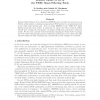Free Online Productivity Tools
i2Speak
i2Symbol
i2OCR
iTex2Img
iWeb2Print
iWeb2Shot
i2Type
iPdf2Split
iPdf2Merge
i2Bopomofo
i2Arabic
i2Style
i2Image
i2PDF
iLatex2Rtf
Sci2ools
118
click to vote
TREC
2007
2007
Relaxed Online SVMs in the TREC Spam Filtering Track
Relaxed Online Support Vector Machines (ROSVMs) have recently been proposed as an efficient methodology for attaining an approximate SVM solution for streaming data such as the online spam filtering task. Here, we apply ROSVMs in the TREC 2007 Spam filtering track and report results. In particular, we explore the effect of various slidingwindow sizes, trading off computation cost against classification performance with good results. We also test a variant of fixed-uncertainty sampling for Online Active Learning. The best results with this approach give classification performance near to that of the fully supervised approach while requiring only a small fraction of the examples to be labeled.
| Added | 07 Nov 2010 |
| Updated | 07 Nov 2010 |
| Type | Conference |
| Year | 2007 |
| Where | TREC |
| Authors | David Sculley, Gabriel Wachman |
Comments (0)

